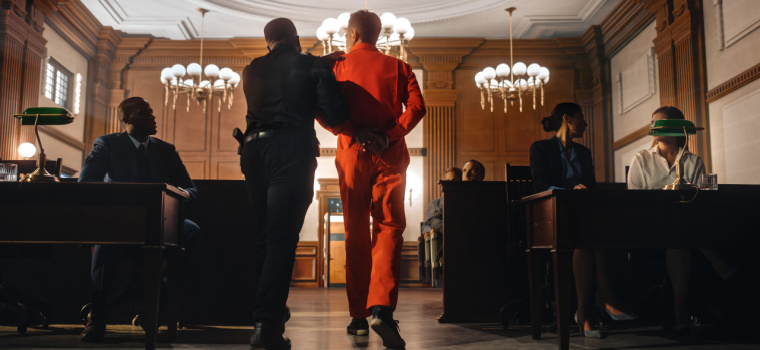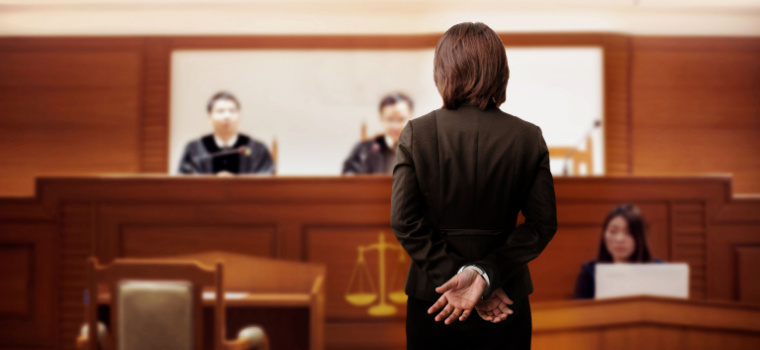Most criminal trials follow a uniform set of procedures. Specific procedures may be modified by local courts or judges, but this step-by-step guide will show you the general process.
Definition of a Criminal Trial
A criminal trial is the determination of the innocence or the guilt of a person accused of breaking the law of either a state government or the federal government. In a criminal trial, charges are brought by the government itself, as opposed to a private plaintiff. A prosecutor represents the government. The person accused of the crime is the defendant, usually represented by their private attorney or a public defender. A judge or jury must determine whether the accused is guilty “beyond a reasonable doubt.”
Steps in a Criminal Trial
A criminal trial is the government’s opportunity to put forward its evidence to obtain a guilty verdict for the accused. After the prosecution makes its case, the defense also has a chance to make its case. There are generally six criminal trial process steps, discussed below.
1. Jury Selection
So what are the stages of a criminal trial? Just how do criminal trials work? Except for occasional cases before a judge, one of the first steps in a criminal trial is jury selection, including the “voir dire” of the jury members. During voir dire, the attorneys and the judge question the jury members to learn about their backgrounds and opinions and to eliminate bias which could cause the defendant to have an unfair trial. Each side usually has the right to eliminate certain jurors from the jury pool, for cause or no cause.
2. Opening Statements
Once a jury is selected, the second of the steps in a criminal case is opening statements from the prosecutor and criminal defense attorney. The “burden of proof” to prove the defendant committed the crime beyond a reasonable doubt is with the prosecution. This is a heavy burden of proof in a criminal trial because the result for the criminal defendant can be fines, jail time, or even harsher punishment in certain jurisdictions where the death penalty is still the law.
3. Witness Testimony and Cross-Examination
After opening statements, the next step of a criminal trial is for each side to present its “case-in-chief” – the prosecution trying to prove the criminal charges beyond a reasonable doubt and the defense trying to cast any doubt on the guilt of the defendant. The case will usually include evidence, such as testimony by fact witnesses and expert witnesses, medical and other reports, photos and video, and other documentary evidence. Witnesses can provide “direct testimony,” where the party calling them asks questions. The witnesses are then “cross-examined” by the other side, usually to refute their credibility or lessen the impact of their testimony.
4. Closing Arguments
Similar to the opening statement, the next stage of a criminal trial is closing arguments. This offer the government and the defense the opportunity to summarize their main arguments and to review what has been shown and what it means to the overall case.
5. Jury Instruction
After the close of evidence, the next of the criminal trial steps is for the judge to provide the evidence with a “jury instruction,” which explains the law that applies to the case. Judges often use jury instructions drafted by attorneys, some of which attempt to explain the law in easy-to-understand ways to non-legally trained members of the community who make up the jury.
6. Jury Deliberation and Verdict
Finally, after receiving instructions from the judge, the final part of a criminal trial is for the jurors to consider as a group the case through a process called “deliberation.” This is where they retire, for as much time as is taken, to a room to review the presented sides and reach a verdict. Nearly all criminal trials require a unanimous verdict. If the jury cannot emerge agreed, it is called a “hung jury.” The case may be dismissed or started again from the jury selection stage.
Before You Go to Trial, Seek Professional Legal Help
At the Law Offices of Seth Kretzer, our Houston criminal defense attorneys are highly skilled and experienced with trials and can answer your questions and help you with your legal needs. Contact our attorneys today through our website or phone at 713-775-3050.




